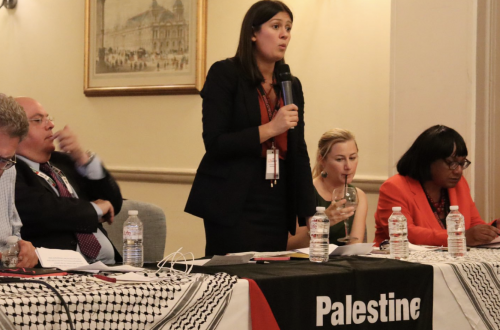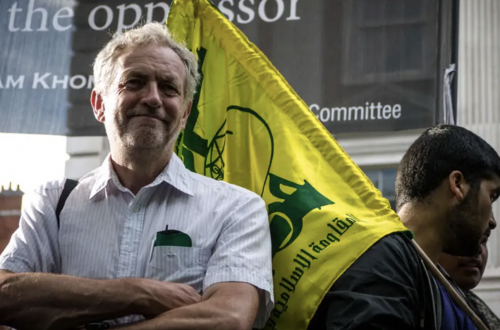5Pillars have recently posted this iERA debate, ‘Is Islam the cause or solution to extremism?’
On Friday 16th Oct 2015, the Islamic Education and Research Academy (iERA) held a cross-panel debate on the criminalisation of Islam and tackling extremism in London entitled, ‘The Big Question: Is Islam The Cause Or Solution To Extremism?’ The panel was chaired by Peter Oborne, the former Chief Political Commentator for The Telegraph and included: Fiyaz Mughal (Tell MAMA), Mohammed Amin (Conservative Muslim Forum), Hamza Tzortzis (iERA), Zara Faris (Muslim Debate Initiative) Dr Anas Altikriti (Cordoba Foundation) and Peter Tatchell (Peter Tatchell Foundation).
It opened with some discussion of the Government’s recent proposed measures and the Prevent strategy. In an early straw man Hamza Tzortzis (4:30) implied that it would no longer be possible to debate the pros and cons of representative vs. direct democracy, or of a first past the post system vs. PR, in a university setting. Fiyaz Mughal expressed some well earned doubt over this characterisation of government policy.
The panel then went on to debate where to draw the red line between legitimate dissent and illegitimate extremism. Here’s Zara Faris’ take on the issue (14:30).
‘Rather than concede this term extremism that really puts everyone – it can put anyone – under the spotlight, why don’t we just use the word ‘terrorism’ to refer to violent acts of terror and allow people to hold differences of opinion amongst themselves, live and let live, to you your beliefs, and to us ours, as long as people are abiding by the laws in the country’.
Clearly it would suit many people’s agenda if we only recognized two categories: terrorists and the rest. Mohammed Amin (from 20:30) was much more precise, and engaged carefully with the complex and contested category of non-violent extremism.
Things heated up when Tatchell began to challenge the panellists to answer some simple questions about their beliefs (from 33:30). Cue evasion and deflection from many. Faris maintained that no connection had been established between particular religious beliefs and terrorism – a (?)fact which will doubtless be very reassuring to apostates.
Various methods of not answering Tatchell’s questions were essayed. Al-Takriti said he wouldn’t answer the questions because he was sure his answers wouldn’t be believed, and then went on to point out that these are issues people have spent years studying. Tzortzis insisted he’d sacrifice his own life to save Peter’s, and that the questions he asked had no practical application in today’s Britain anyway. Interesting emphases. Al-Takriti said the fact children were sometimes challenged inappropriately over their views at school meant such questions were invalid. He – at least I think this was his point – also said he wouldn’t answer the questions because doing so wouldn’t stop the tabloids being bigoted.
Faris first said ‘I am not going to indulge your wild characterisations of Islam’ (55:30) but later asserted that the word extremism is used to censor Muslims from expressing certain beliefs. Which beliefs, I wonder, did she have in mind, if supporting hudud punishments is ‘wild’? Yes, there is some possible middle ground between issues such as wearing the hijab and fasting, on the one hand, and stoning adulterers on the other. Gender segregation is one example. But it would have saved a lot of time – and been more interesting – if people had just answered the questions.
In fact later Al-Takriti strongly implied that he did not support worldly punishments for apostasy (1:11:48) – quoting the familiar verse about there being no compulsion in religion. This is used by many to uphold complete freedom of conscience even though in context it seems to apply only to potential converts to Islam, not to potential apostates.* (I’ll be interested to see if I get any responses to a question about this which I asked on 5Pillars.)
Mohammed Amin had some good answers to bad questions from Zara Faris on foreign policy (1:19:40) and Peter Tatchell calmly countered Hamza Tzortzis’ suggestion that he was a kind of mirror image Islamist wanting to impose secularism on a nation, and gave a careful answer to a question about democratic decisions which acknowledged the problem of majoritarianism.
There was much to annoy in this discussion. In a competitive field a strong candidate for the most irritating observation was Tzortzis’ suggestion that some Christians felt persecuted in the UK and would probably feel better protected in an Islamist society (1:36).
Update. Mohammed Amin has posted on his own responses to the debate here – and has also responded to Peter Tatchell’s questions.
*I don’t mean to imply that there are no cogent grounds for arguing that Islam does not prescribe worldly punishments for apostasy.


